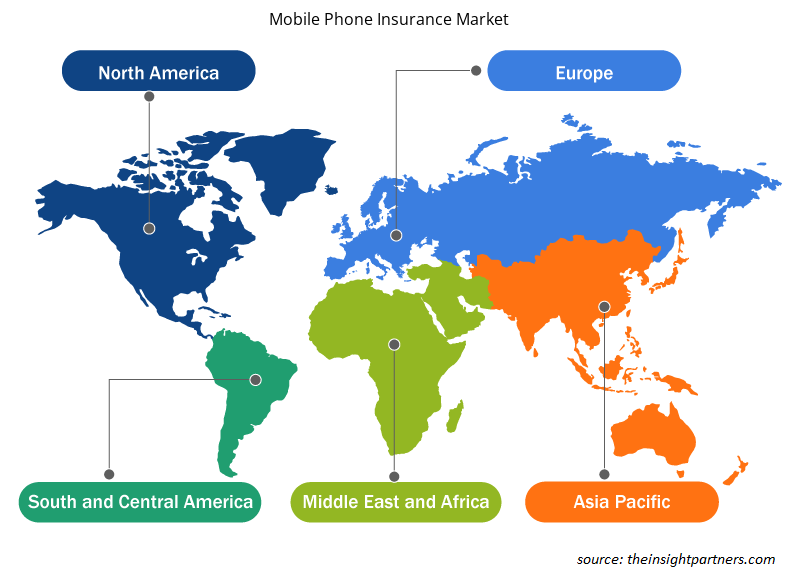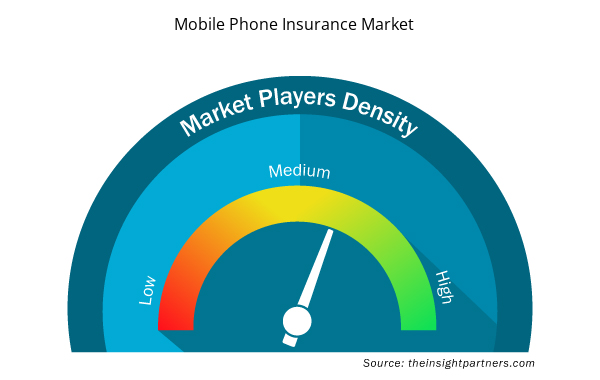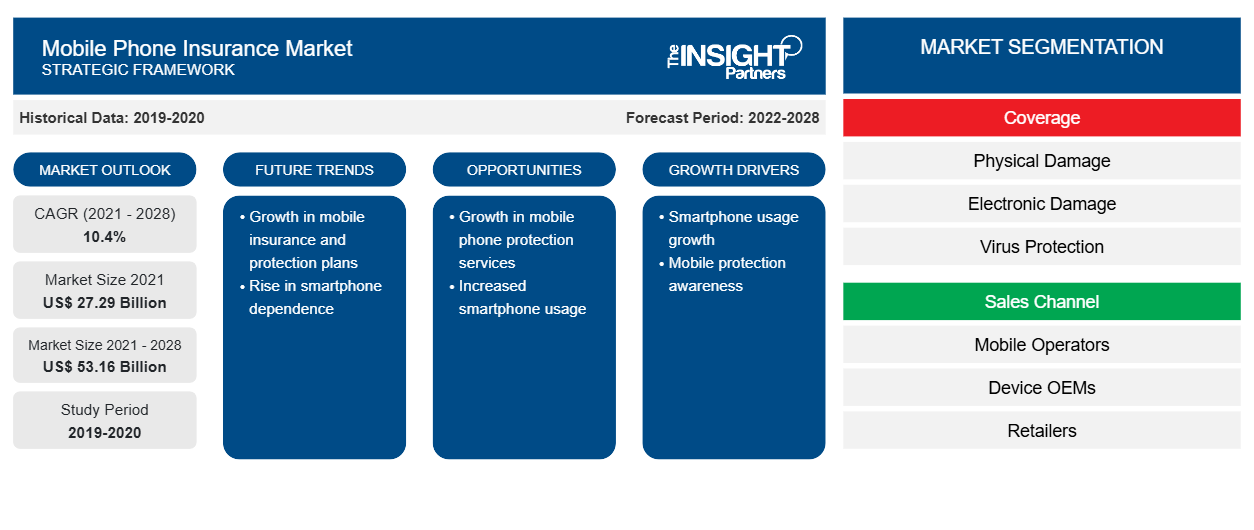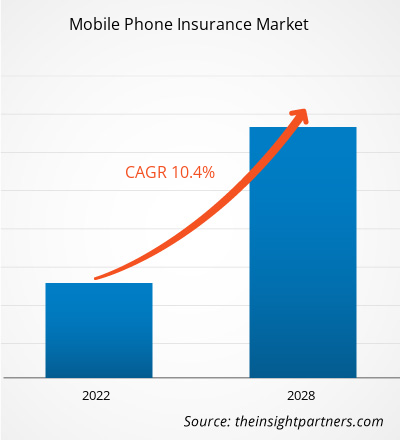[研究报告] 手机保险市场价值预计将从 2021 年的 272.9183 亿美元增长到 2028 年的 531.6184 亿美元;预计 2022 年至 2028 年市场复合年增长率为 10.4%。CAGR of 10.4% from 2022 to 2028.
分析师观点:
手机保险是一个快速增长的市场,为丢失、被盗或损坏的手机提供保险。市场竞争激烈,许多公司提供不同的计划和保险选项,以满足消费者的不同需求。智能手机的高成本以及对损坏或丢失的保护需求推动了手机保险的增长。这些计划通常涵盖意外损坏、盗窃和设备丢失。一些计划为水损坏、屏幕破裂和其他问题提供额外的保险。随着越来越多的人采用智能手机并寻求设备保护,手机保险市场预计将增长。智能手机频繁升级的趋势也有望推动市场发展。
市场概况:
手机保险是一种服务合同,为零售商和服务提供商销售的手机提供零部件和维修服务。它通常为手机提供进一步的保护,防止被盗、故意损坏、未经授权使用和电子钱包交易。手机保险还涵盖机械和电气问题的费用和不便。推动手机保险市场增长的主要原因之一是意外损坏、手机被盗、病毒感染和设备故障的增加。另一个重要因素是高质量智能手机的普及。此外,由于更换关键部件的成本高昂,手机保险市场也在增长。手机保险单通常涵盖物理损坏、内部覆盖失效、盗窃和丢失保护以及病毒和数据保护。
定制此报告以满足您的需求
您可以免费定制任何报告,包括本报告的部分内容、国家级分析、Excel 数据包,以及为初创企业和大学提供优惠和折扣
- 获取此报告的关键市场趋势。这个免费样品将包括数据分析,从市场趋势到估计和预测。
市场驱动因素:
高品质智能手机普及率飙升推动手机保险市场增长
高质量智能手机的普及率激增,从多个方面推动了手机保险市场的发展。首先,高质量智能手机价格昂贵,维修或更换成本可能很高。因此,消费者越来越多地通过手机保险计划寻求设备保护。这些计划通常涵盖意外损坏、盗窃和设备丢失。其次,高质量智能手机比其前代产品更先进,功能更多。这意味着它们更容易因跌落、进水和其他意外而受损。手机保险计划为此类损害提供保险,这对于想要保护投资的消费者来说至关重要。第三,高质量智能手机的普及率激增,通过增加对丢失或被盗保险的需求推动了手机保险市场的发展。高质量智能手机是小偷的目标,丢失或被盗的风险高于廉价设备。手机保险计划为此类风险提供保险,这对于想要保护投资的消费者来说至关重要。最后,高质量智能手机的普及率激增,通过增加对故障和失灵保险的需求推动了手机保险市场的发展。高品质智能手机比其前代产品更复杂,且有更多可能出现故障的部件。手机保险计划可以提供针对此类风险的保障,这对于想要保护投资的消费者来说至关重要。
节段分析:
根据保险范围,市场细分为物理损坏、电子损坏、病毒防护和盗窃防护。物理损坏部分在 2020 年占据了最大的市场份额。人们对性病和艾滋病毒的认识不断提高,导致全球避孕套的使用量增加。物理损坏部分是最重要的手机保险市场,占据了大部分市场份额。这是因为智能手机是易碎且昂贵的设备,很容易损坏,许多消费者愿意支付保险费用来保护他们的设备免受物理损坏。这一细分市场的增长还归功于智能手机在全球范围内的普及和高端智能手机的普及。未来几年,对保护智能手机免受意外损坏的保险需求将保持强劲。
区域分析:
2021 年亚太地区手机保险市场价值为 54.076 亿美元,预计到 2028 年将达到 132.3889 亿美元;预计在预测期内复合年增长率为 14.0%。由于几个关键因素,亚洲是手机保险市场增长最快的地区。首先,该地区的智能手机普及率正在迅速提高。随着亚洲越来越多的人从基本手机过渡到智能手机,手机保险的潜在客户群显着扩大。这个不断增长的智能手机用户市场对保险覆盖范围的需求更高,以保护他们的宝贵设备。其次,亚洲中产阶级的崛起提高了可支配收入和购买力。因此,越来越多的人有能力投资智能手机,智能手机正日益成为日常生活中不可或缺的一部分。随着智能手机的价值和重要性不断提高,消费者认识到有必要保护他们的设备免受意外损坏、盗窃或丢失。智能手机保护意识的不断增强推动了该地区对手机保险的需求。第三,电子商务和数字支付系统的进步使亚洲消费者更容易获得和购买手机保险。在线平台和移动应用程序为获得保险提供了方便和简化的流程,吸引了更大的客户群。
此外,多种支付方式(包括数字钱包和网上银行)的出现,进一步促进了亚洲消费者购买手机保险。此外,该地区网络覆盖范围的扩大和互联网连通性的改善在推动手机保险增长方面发挥了至关重要的作用。随着连通性的提高,用户在各种活动中(如通信、银行、购物和娱乐)更多地依赖智能手机。对智能手机的这种日益增长的依赖提高了保险覆盖的感知价值,促使更多人寻求对其设备的保护。最后,电信运营商和设备制造商提供捆绑保险的趋势日益增长,促进了亚洲手机保险市场的增长。这些捆绑套餐通常将手机保险与其他服务(如延长保修、数据计划或设备升级)结合在一起。这种全面的服务为客户提供了额外的便利和价值,使手机保险具有吸引力。这些因素加上人们对智能手机保护的认识和重要性的不断提高,促使亚洲成为手机保险市场增长最快的地区。
关键球员分析:
手机保险市场分析包括安联、美国国际集团、苹果公司、美国电话电报公司、英杰华、Gadget Cover、Pier Insurance Managed Services Ltd. 和西班牙电信有限公司等参与者。在手机保险参与者中,苹果公司和美国电话电报公司凭借其提供的多样化产品组合位居前两位。
手机保险市场区域洞察
Insight Partners 的分析师已详细解释了预测期内影响手机保险市场的区域趋势和因素。本节还讨论了北美、欧洲、亚太地区、中东和非洲以及南美和中美洲的手机保险市场细分和地理位置。

- 获取手机保险市场的区域特定数据
手机保险市场报告范围
| 报告属性 | 细节 |
|---|---|
| 2021 年市场规模 | 272.9亿美元 |
| 2028 年市场规模 | 531.6亿美元 |
| 全球复合年增长率(2021 - 2028) | 10.4% |
| 史料 | 2019-2020 |
| 预测期 | 2022-2028 |
| 涵盖的领域 | 按覆盖范围
|
| 覆盖地区和国家 | 北美
|
| 市场领导者和主要公司简介 |
|
市场参与者密度:了解其对商业动态的影响
手机保险市场正在快速增长,这得益于终端用户需求的不断增长,这些需求源于消费者偏好的不断变化、技术进步以及对产品优势的认识不断提高等因素。随着需求的增加,企业正在扩大其产品范围,进行创新以满足消费者的需求,并利用新兴趋势,从而进一步推动市场增长。
市场参与者密度是指在特定市场或行业内运营的企业或公司的分布情况。它表明相对于给定市场空间的规模或总市场价值,有多少竞争对手(市场参与者)存在于该市场空间中。
在手机保险市场运营的主要公司有:
- 美国国际集团
- 安联
- 苹果公司
- AT&T 公司
- 英杰华保险有限公司
免责声明:上面列出的公司没有按照任何特定顺序排列。

- 了解手机保险市场顶级关键参与者概况
最新动态:
手机保险市场中的公司大量采用并购等无机和有机策略。以下列出了一些近期的关键市场发展:
- 2020 年 10 月,Bolttech 宣布与泰国三星建立合作伙伴关系。通过此次合作,bolttech 通过 Samsung Care+ 计划为三星 Galaxy 智能手机和平板电脑用户提供移动设备维修服务。
- 2021 年 10 月,Assurant 宣布收购领先的移动设备以旧换新和再利用解决方案提供商 HYLA Mobile。此次收购有望通过为客户提供更全面的解决方案套件来增强 Assurant 在手机保险生态系统市场的地位。HYLA Mobile 在设备以旧换新和翻新方面的专业知识将使 Assurant 能够为客户提供更可持续、更具成本效益的解决方案,同时减少浪费并支持循环经济。
- 2021 年 3 月,SquareTrade 推出了一款新的手机保险产品,为丢失或被盗的设备提供保障,并提供标准的意外损坏保护。这款名为“丢失和被盗保护”的产品可供新老 SquareTrade 客户使用,为丢失或被盗的设备提供高达 1,000 美元的保障。此举旨在解决智能手机用户对被盗和丢失风险日益增长的担忧,并为客户提供额外的保护。
- 历史分析(2 年)、基准年、预测(7 年)及复合年增长率
- PEST 和 SWOT 分析
- 市场规模价值/数量 - 全球、区域、国家
- 行业和竞争格局
- Excel 数据集



Report Coverage
Revenue forecast, Company Analysis, Industry landscape, Growth factors, and Trends

Segment Covered
This text is related
to segments covered.

Regional Scope
North America, Europe, Asia Pacific, Middle East & Africa, South & Central America

Country Scope
This text is related
to country scope.
常见问题
The estimated market size for the mobile phone insurance market was US$27,291.83 million in 2021.
Surge in uptake of high-quality smartphone and increasing cases of accidental damage, phone theft, and gadget failure are the key factors driving the mobile phone insurance market over the forecast period.
Simplification of insurance claiming procedure and growing trend for insuring new phones are the key trending factors driving the market growth.
The incremental growth of the mobile phone insurance market is 10.4% during 2022 to 2028.
Canada and India are the prominent countries registered the highest growth rate of 15.5% and 19.4% respectively, during the forecast period.
The global market size for mobile phone insurance market will be US$ 53,161.84 million in 2028.
The key companies operating in the mobile phone insurance market that are profiled in the report include Allianz; American International Group, Inc.; Apple Inc.; AT&T Inc.; Aviva; Gadget Cover; Pier Insurance Managed Services Ltd.; and Telefónica Limited.
Asia Pacific region is the fastest growing region in the mobile phone insurance market.
Physical damage segment is holding larger market share during the forecast period.
Trends and growth analysis reports related to Banking, Financial Services, and Insurance : READ MORE..
The List of Companies - Mobile Phone Insurance Market
- American International Group, Inc.
- Allianz SE
- Apple Inc.
- AT&T Inc.
- Aviva insurance Limited
- Better Buy Insurance
- Gadget Cover
- Insurance2go
- Telefónica Limited
- Pier Insurance Managed Services Ltd.
- AQILO Business Consulting GmbH.
- Square Trade Inc.
- Switched On Insurance
The Insight Partners performs research in 4 major stages: Data Collection & Secondary Research, Primary Research, Data Analysis and Data Triangulation & Final Review.
- Data Collection and Secondary Research:
As a market research and consulting firm operating from a decade, we have published and advised several client across the globe. First step for any study will start with an assessment of currently available data and insights from existing reports. Further, historical and current market information is collected from Investor Presentations, Annual Reports, SEC Filings, etc., and other information related to company’s performance and market positioning are gathered from Paid Databases (Factiva, Hoovers, and Reuters) and various other publications available in public domain.
Several associations trade associates, technical forums, institutes, societies and organization are accessed to gain technical as well as market related insights through their publications such as research papers, blogs and press releases related to the studies are referred to get cues about the market. Further, white papers, journals, magazines, and other news articles published in last 3 years are scrutinized and analyzed to understand the current market trends.
- Primary Research:
The primarily interview analysis comprise of data obtained from industry participants interview and answers to survey questions gathered by in-house primary team.
For primary research, interviews are conducted with industry experts/CEOs/Marketing Managers/VPs/Subject Matter Experts from both demand and supply side to get a 360-degree view of the market. The primary team conducts several interviews based on the complexity of the markets to understand the various market trends and dynamics which makes research more credible and precise.
A typical research interview fulfils the following functions:
- Provides first-hand information on the market size, market trends, growth trends, competitive landscape, and outlook
- Validates and strengthens in-house secondary research findings
- Develops the analysis team’s expertise and market understanding
Primary research involves email interactions and telephone interviews for each market, category, segment, and sub-segment across geographies. The participants who typically take part in such a process include, but are not limited to:
- Industry participants: VPs, business development managers, market intelligence managers and national sales managers
- Outside experts: Valuation experts, research analysts and key opinion leaders specializing in the electronics and semiconductor industry.
Below is the breakup of our primary respondents by company, designation, and region:

Once we receive the confirmation from primary research sources or primary respondents, we finalize the base year market estimation and forecast the data as per the macroeconomic and microeconomic factors assessed during data collection.
- Data Analysis:
Once data is validated through both secondary as well as primary respondents, we finalize the market estimations by hypothesis formulation and factor analysis at regional and country level.
- Macro-Economic Factor Analysis:
We analyse macroeconomic indicators such the gross domestic product (GDP), increase in the demand for goods and services across industries, technological advancement, regional economic growth, governmental policies, the influence of COVID-19, PEST analysis, and other aspects. This analysis aids in setting benchmarks for various nations/regions and approximating market splits. Additionally, the general trend of the aforementioned components aid in determining the market's development possibilities.
- Country Level Data:
Various factors that are especially aligned to the country are taken into account to determine the market size for a certain area and country, including the presence of vendors, such as headquarters and offices, the country's GDP, demand patterns, and industry growth. To comprehend the market dynamics for the nation, a number of growth variables, inhibitors, application areas, and current market trends are researched. The aforementioned elements aid in determining the country's overall market's growth potential.
- Company Profile:
The “Table of Contents” is formulated by listing and analyzing more than 25 - 30 companies operating in the market ecosystem across geographies. However, we profile only 10 companies as a standard practice in our syndicate reports. These 10 companies comprise leading, emerging, and regional players. Nonetheless, our analysis is not restricted to the 10 listed companies, we also analyze other companies present in the market to develop a holistic view and understand the prevailing trends. The “Company Profiles” section in the report covers key facts, business description, products & services, financial information, SWOT analysis, and key developments. The financial information presented is extracted from the annual reports and official documents of the publicly listed companies. Upon collecting the information for the sections of respective companies, we verify them via various primary sources and then compile the data in respective company profiles. The company level information helps us in deriving the base number as well as in forecasting the market size.
- Developing Base Number:
Aggregation of sales statistics (2020-2022) and macro-economic factor, and other secondary and primary research insights are utilized to arrive at base number and related market shares for 2022. The data gaps are identified in this step and relevant market data is analyzed, collected from paid primary interviews or databases. On finalizing the base year market size, forecasts are developed on the basis of macro-economic, industry and market growth factors and company level analysis.
- Data Triangulation and Final Review:
The market findings and base year market size calculations are validated from supply as well as demand side. Demand side validations are based on macro-economic factor analysis and benchmarks for respective regions and countries. In case of supply side validations, revenues of major companies are estimated (in case not available) based on industry benchmark, approximate number of employees, product portfolio, and primary interviews revenues are gathered. Further revenue from target product/service segment is assessed to avoid overshooting of market statistics. In case of heavy deviations between supply and demand side values, all thes steps are repeated to achieve synchronization.
We follow an iterative model, wherein we share our research findings with Subject Matter Experts (SME’s) and Key Opinion Leaders (KOLs) until consensus view of the market is not formulated – this model negates any drastic deviation in the opinions of experts. Only validated and universally acceptable research findings are quoted in our reports.
We have important check points that we use to validate our research findings – which we call – data triangulation, where we validate the information, we generate from secondary sources with primary interviews and then we re-validate with our internal data bases and Subject matter experts. This comprehensive model enables us to deliver high quality, reliable data in shortest possible time.


 获取此报告的免费样本
获取此报告的免费样本